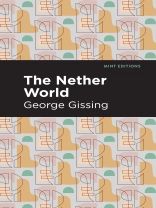An exploration of the class struggle in nineteenth century London where a potential inheritance turns family and friends into desperate foes eager to escape their circumstance. A compelling story about greed, deception and the innate need to survive. Michael Snowdon lives like a pauper despite inheriting a massive fortune. He plans to leave his money to Jane, his neglected granddaughter, in hopes that she will spend it on charitable causes. Yet, Michael’s estranged son Jonathan wants to acquire the funds for himself. He tries to create a wedge between his father and Jane, making it easier for him to make a claim. The story highlights the horrors of poverty and the extremes people are willing to go to escape it. The Nether World is a detailed and complex story about society’s most vulnerable people. George Gissing delivers a brutally honest picture of class disparity in Victorian era England. It is a time and a place fueled by both desperation and hope. With an eye-catching new cover, and professionally typeset manuscript, this edition of The Nether World is both modern and readable.
Since our inception in 2020, Mint Editions has kept sustainability and innovation at the forefront of our mission. Each and every Mint Edition title gets a fresh, professionally typeset manuscript and a dazzling new cover, all while maintaining the integrity of the original book.
With thousands of titles in our collection, we aim to spotlight diverse public domain works to help them find modern audiences. Mint Editions celebrates a breadth of literary works, curated from both canonical and overlooked classics from writers around the globe.
Про автора
George Gissing (1857-1903) was an English novelist. Born in Yorkshire, he excelled as a student from a young age, earning a scholarship to Owens College where he won prizes for his poetry and academic writing. Expelled and arrested for a series of thefts in 1876, Gissing was forced to leave England for the United States, teaching classics and working as a short story writer in Massachusetts and Chicago. The following year, he returned to England and embarked on a career as a professional novelist, publishing works of naturalism inspired by his experience of poverty and the works of Charles Dickens. After going through an acrimonious divorce, Gissing remarried in 1891 and entered a turbulent relationship with Edith Alice Underwood, with whom he raised two children before separating in 1897. During this time, after writing several unpublished novels, Gissing found success with New Grub Street (1891), Born in Exile (1892), and The Odd Women (1893). In the last years of his life, Gissing befriended H.G. Wells and travelled throughout Italy, Germany, and France, where he died after falling ill during a winter walk.












